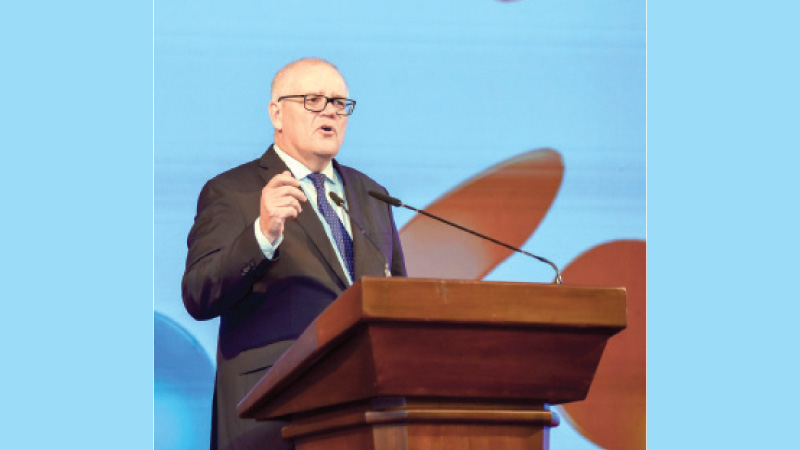Former Prime Minister of Australia Scott Morrison outlined the urgent priorities for Sri Lanka’s advancement, acknowledging President Ranil Wickremesinghe’s accomplishments during challenging times.
He was speaking at the Sri Lanka Human Capital Summit 2024 at Temple Trees on Thursday, on the theme “Unlocking Sri Lanka’s Economic Potential by Building a Future-Ready Workforce,” focusing on nurturing, harnessing, and amplifying human capital.
Morrison expressed concern for the enduring struggles faced by Sri Lankans, ranging from natural disasters to economic crises and conflicts, praising their resilience and perseverance. Highlighting the need to secure a prosperous future for Sri Lanka, Morrison underscored the critical reforms necessary for economic stability.
These included fiscal repair, revenue reforms, debt restructuring, and bolstering financial institutions’ independence. He stressed the importance of transparency in governance, anti-corruption measures, and enhancing the social safety net, all initiatives championed by President Wickremesinghe which is crucial for Sri Lanka’s long-term prospects.
He said the discussions often focus on the need for a future-ready workforce, but realising this future needs immediate action. President Wickremesinghe has performed an extraordinary task in stabilising the country following the economic crisis of two years ago.
Morrison advocated for Sri Lanka’s active engagement in regional partnerships, particularly through the Quadrilateral Leaders’ Dialogue, where cooperation with India, the United States, Japan, and Australia could strengthen security, sovereignty, and economic success.
He urged a steadfast focus on economic stability as the foundation for building a dynamic, export-oriented economy, enabled by strategic partnerships with international allies committed to Sri Lanka’s sovereignty and independence.
Chairman of the Human Capital Summit, Dinesh Weerakkody said that Sri Lanka needs to rapidly develop a skilled workforce to position itself as a preferred business and investment destination post-crisis.
He said that the Summit was initiated by the President in 2016 to bring together key stakeholders from the public and private sectors to address these skills challenges.
Many proposals have since been implemented across various sectors, but much more remains to be done to transform Sri Lanka into a talent capital.
The 2024 summit discussed several proposals for talent attraction, retention and capacity building in key sectors. The findings will be presented to President Ranil Wickremesinghe in one month.
Over 65 speakers and panellists addressed the gathering and over 609 people were present.









